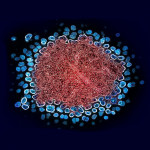A long-acting injectable HIV treatment of cabotegravir and Edurant (rilpivirine) dosed every four weeks will advance to Phase III trials after eight-week dosing proved less successful. Forty-eight-week results from the Phase IIb, multicenter, parallel group, open-label study of LATTE-2, which included 309 treatment-naive adults with HIV, were presented at the 21st International AIDS Conference in Durban, South Africa (AIDS 2016).
Results from the first 32 weeks of the trial were presented in February at the 2016 Conference on Retroviruses and Opportunistic Infections (CROI) in Boston.
Participants initially went through a 20-week treatment induction period, treated with daily oral cabotegravir plus Epzicom (abacavir/lamivudine). Those with an undetectable viral load, 286 people all told, were then randomized 2 to 1 to 1 into the study’s maintenance period to receive injections of cabotegravir plus Edurant every four or eight weeks or to continue taking the same oral regimen.
Five percent of those receiving injections every eight weeks had a detectable viral load 48 weeks into the maintenance period, compared with less than 1 percent of those in the four-week dosing group and no one on the oral regimen. Five out of the six people in the eight-week dosing group did subsequently achieve a fully suppressed viral load, however. Three participants experienced virologic failure during the study, including one in the oral treatment group (at week eight) and two in the eight-week dosing group (at weeks four and 48, respectively).
Individuals in the injectable groups commonly experienced grade 1 or 2 injection site pain, which lasted a median of three days.
Seven percent of those in the injectable group experienced serious adverse health events during the maintenance period, as did 5 percent of those in the oral treatment group; none of these events was judged related to the HIV treatment.
The researchers concluded that both four-week and eight-week dosing of long-acting cabotegravir and Edurant led to good virologic response rates and were generally well tolerated through 48 weeks of treatment. However, rates of those with detectable viral loads at the end of the study period were modestly better among those in the four-week dosing group compared with the eight-week group. Consequently, the four-week dosing was chosen to advance to Phase III trials. Meanwhile, researchers will continue to evaluate the four- and eight-week dosing methods among the participants in the LATTE-2 trial.







Comments
Comments